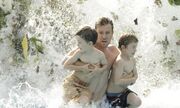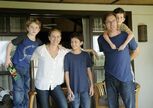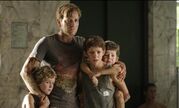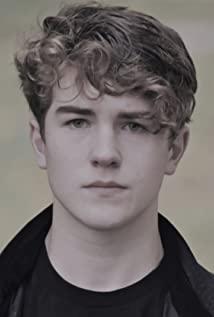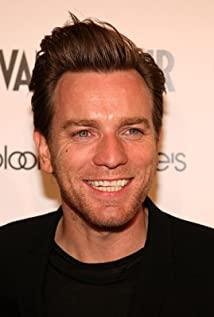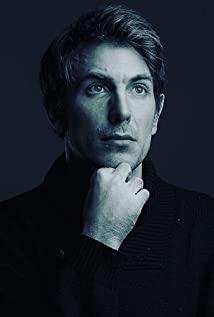's "growth education" here refers to the moral, intellectual, and physical education of the guardian during the growth of young people, which is consistent with the content of "life education". (Baidu Encyclopedia: "Life education is a kind of holistic education, which includes not only the concern for life, but also the cultivation of survivability and the promotion of life value.") The
last one gave me some ideas about growth education abroad The movie I think about is "Little Sunshine", and this "Scary Howl" also made me feel a lot. In particular, Lucas's performance in the face of disaster in the film is particularly impressive. This is naturally inseparable from the usual education of their parents. This article tries to make a brief comment on the scenes in the film. There are many spoilers, please read carefully.
1. Respect the education
scene 1: In the hotel, Lucas opened the refrigerator and saw Coke. His mother asked him to drink water, and he obediently put the Coke back.
Scene 2: Lucas found Maria's foot injury. When Maria turned around, her clothes were ragged and her chest was exposed. Lucas turned her head and said that she couldn't see her without clothes, and then apologized.
Scene 3: On the tree, Lucas opened the Coke and gave it to her mother. Maria took a sip and gave it to Daniel. After a sip, Daniel gave it back to Maria, stroking her hair and holding her hand.
Scene 4: In the car, little Simon said that he was urinating, and Tomas made him hold it. It wasn't until later that he couldn't hold back anymore, Simon ran out of the car to pee.
In these scenes, the children's respect for the elders, the respect for women, the respect for each other, and the respect for others are reflected respectively. Admittedly, it seems to be too trivial, it's just the most basic question of politeness. But it is these most basic ones that are often overlooked by children, and even disapproved by adults.
I personally believe that subconscious reactions can best reflect the subtlety of education.
2. Kind-hearted education
scene 1: When he heard Daniel's call for help, Lucas thought "we cannot protect ourselves and cannot help", and my mother said "even if we are going to die, we have to save him."
Scene 2: In the hospital, the mother asked Lucas to divide the oranges among others, and praised him as the child who is best at helping others, and asked him to go to the hospital to help and do anything.
Scene 3: When my father is looking for someone by himself, he is also helping others to find someone.
Compassion and helping the weak are important elements of "good education" for children. A very important point in kind education is the "education of love". No matter whether the child can succeed in the future, he must at least have a heart of gold.
3. Responsibility education
scenario 1: Lucas, since the tsunami, has taken on the responsibility of taking care of his mother.
Scene 2: Tomas, a child who would be afraid of the bumps while flying, and could not sleep in the hotel because of the fear, ran to find his mother, but he could promise his father to take care of his younger brother. At the refuge on the top of the mountain, Simon said he was scared. Little Tomas taught him to "close his eyes and think of something happy" and help him cover the quilt.
The word "Promise" appears many times in the movie: On the way to take my mother to the hospital, Lucas said "I won't leave you", promise; in the hospital, my mother asked Lucas to help, and he was worried "I will go away." Are you really okay?" He didn't leave until his mother promised... Keeping promises is an important performance of responsibility.
4. Survival Education
Scene 1: Swimming. If it is not for a child as young as Simon to swim, then once the tsunami comes, there is basically no hope of survival.
Scene 2: After the tsunami, Lucas picked up Coke from the water to highlight his awareness of survival. After the water receded, he and his mother evacuated to a high place to wait for rescue, and understood that it is very important to collect fresh water resources at hand without knowing when the rescue will come.
An important subject in survival education is "disaster education". Cultivating survival awareness, survivability and attitude towards survival is the main content of education.
While in the water, Lucas trembles with fear, holding his mother and crying "I am afraid, let's go home, okay", while his mother gently said in his ear "I am also afraid". A similar conversation also appeared between the father and the two children: the father wants to continue to find the whereabouts of his wife and eldest son, and ask Tomas to take care of the younger son Simon. He said "I am afraid", and the father said "I am afraid" and then said "What should I do if Mom and Lucas are alone and scared," Tomas seemed to understand.
It is this kind of education that makes us feel that when facing a disaster, fear itself is not terrible, nor shameful. It is a normal response. Apart from fear, we have many more important things to do. It is not so much that the disaster made the boy a little man, it is better to say that the usual education played a role at this time.
5. Death education
scene 1: Lucas saw so many dead bodies on the way to take her mother to the hospital.
Scene 2: In the tent, Lucas looked through the death register and looked at the unrecognizable photos.
Scene 3: On the top of the mountain, a conversation between a 74-year-old woman and a seven-and-a-half-year-old Thomas.
Thomas said he likes to watch the stars, and the woman said: "Some of those stars have been burnt out for a long, long time. They're dead, but once they were so bright that their light is still travelling through space. We can still see them." (Some stars burned out a long, long time ago. They died, but they also gave out dazzling rays of light. Those rays of light passed through the vast universe and were finally seen by our eyes.)
Here is a direct quote from Baidu Encyclopedia: The vast majority of American parents regard "death" as a kind of "emotional knowledge" stored in their children's "knowledge base". They asserted that one day, when a puppy, kitten or family member in the family really returns to the West, the child will be able to use the "emotional knowledge" he needs to understand the deep sorrow he will face. .
6. The postscript
may be questioned, thinking that this is just a movie, of course there are fictional and exaggerated elements. It is true that the children in the film are more mature and calm than what we think "should" in our consciousness, and it may not be possible to change to an adult. What we want to analyze is not the specific examples in this movie, but the phenomena reflected in these examples.
Imagine why when we talk about the children of the Celestial Kingdom, the most common labels we think of are: disrespect for others, willfulness, dominance, pampering, poor survivability, selfishness... and other derogatory descriptions? Of course, there are many compliments. Individual cases cannot represent commonalities, but they can reflect commonalities.
Compared with the "examination-oriented education" widely criticized by the Chinese dynasty, foreign "quality education" has always been respected and yearned for. However, in writing such an article, the original intention is not to fawn on foreigners, but to explain "how is right", not "who is right". Naturally, foreign countries do not do that, and domestically, they do that too. However, in terms of proportion, foreign countries are mostly common phenomena, while domestic ones are rare cases.
The essence of education is to educate people, "teaching" is the means, and "education" is the goal. However, domestic schools and families are much more than teaching and neglecting education, and are limited to the form and the heart. Whenever they see all kinds of "bear children" with no lower limit and three incorrect views, they are often surprised and angry. As a person of "the sum of social relations", the most basic characteristics are quality and wisdom. Therefore, education should also focus on the cultivation of people's mental and ideological abilities. This is what we need to learn and learn from.
In the movie, the scene of the reunion at the station impressed me deeply. In front of the running brothers, Lucas looked like a brother; and in front of his father, he was running like a child. Lucas, like most kids, will bully his younger brother, and when he is afraid, he didn't want to save Daniel at first, but we all see what happened later. He didn't grow up in one step. It was under the guidance of his parents' physical education that he slowly showed his maturity.
2013-1-10
View more about The Impossible reviews



